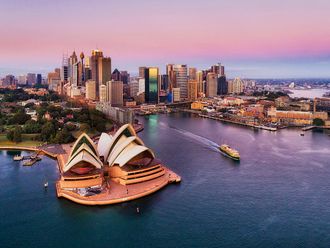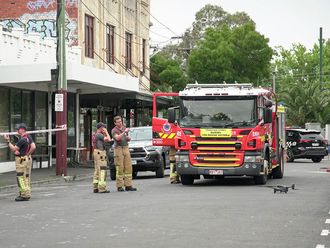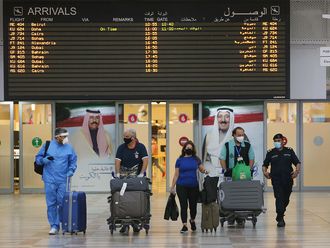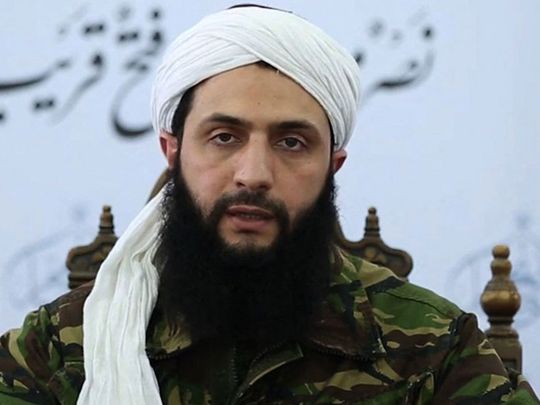
Dubai: For years, Abu Mohammed Al Jolani, leader of Syria’s Islamist rebel alliance that toppled Syian President Bashar Al Assad, operated in the shadows as a hardline militant.
Today, the man once synonymous with extremism is stepping into the limelight, presenting himself as a pragmatic leader with a vision for Syria.
In his first sit-down media interview in years, at an undisclosed location in Syria, he spoke to CNN about plans to create a government based on institutions and a “council chosen by the people.”
“When we talk about objectives, the goal of the revolution remains the overthrow of this regime. It is our right to use all available means to achieve that goal,” said Al Jolani.
“The seeds of the regime’s defeat have always been within it… the Iranians attempted to revive the regime, buying it time, and later the Russians also tried to prop it up. But the truth remains: this regime is dead.”
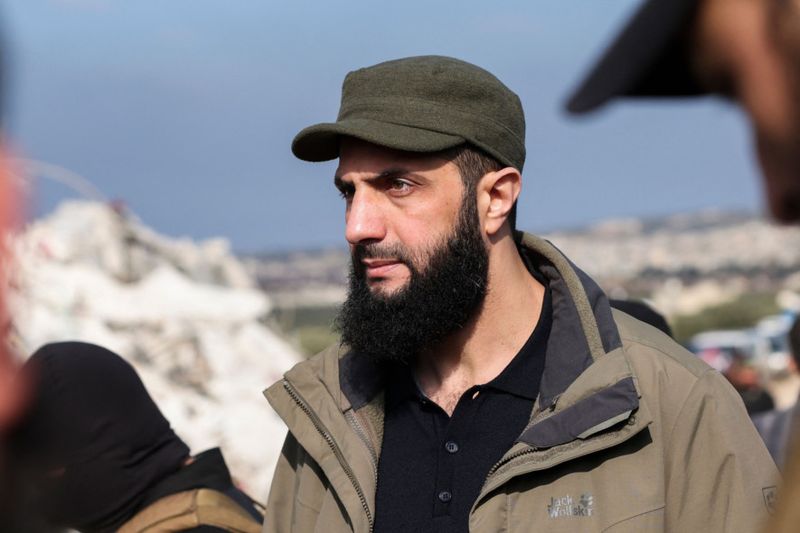
Born: 1982, Mazzeh, Damascus, Syria.
Background: Raised in an affluent family, he excelled as a student before being drawn to militant ideology post-9/11.
Militant career: Joined Al Qaida in Iraq under Abu Musab Al Zarqawi, later founded Al Nusra Front (Al Qaida’s Syrian branch) in 2011.
Key decisions: Refused allegiance to Daesh in 2013; severed ties with Al Qaida in 2016 to form Hayat Tahrir Al Sham (HTS).
Current role: Leader of HTS.
Rebranding efforts: Publicly uses his real name, projects a moderate image, and engages with international media to position himself as a credible statesman.
Controversies: HTS accused of war crimes, human rights abuses, and continued designation as a terrorist organisation by the US and others.
Vision: Establishing security and governance in Syria.
Dressed in khaki fatigues instead of the militant turban he once sported, Al Jolani, a few days ago, mingled with supporters in Aleppo, the country’s second-largest city.
He made an appearance after his group, Hayat Tahrir Al Sham (HTS), took control of the city for the first time during Syria’s protracted civil war.
As he waved to crowds and gives interviews to international media, Al Jolani, now publicly using his real name Ahmed Al Sharaa, seems intent on reshaping his image.
From Damascus student to Al Qaida commander
Born in 1982 in Mazzeh, an upscale district of Damascus, Ahmed Al Sharaa came from a well-off family and was known as a diligent student.
However, the events of 9/11 marked a turning point. Drawn to the militant ideology of Al Qaida, Al Jolani began attending secret sermons and discussions in marginalised Damascus suburbs. Following the US-led invasion of Iraq, he joined the insurgency led by Abu Musab Al Zarqawi, a key Al Qaida figure.
His rise through the ranks was interrupted by a five-year imprisonment, but the Syrian uprising in 2011 brought him back to his homeland, where he founded the Al Nusra Front, Syria’s Al Qaida affiliate.
Unlike other militant leaders, Al Jolani refused to swear allegiance to Daesh leader Abu Bakr Al Baghdadi in 2013, instead pledging loyalty to Al Qaida’s Ayman Al Zawahiri. This decision defined his position as a key player in Syria’s fragmented opposition.
Breaking with Al Qaida
In 2016, Al Jolani declared that his group was severing ties with Al Qaida, a move he claimed was to protect Syrians from Western attacks.
This marked the formation of HTS, which began consolidating power in northwest Syria. While his rhetoric softened, the United States designated HTS a terrorist organisation in 2018, placing a $10 million bounty on Al Jolani. Observers remain divided on his motives. “He is a pragmatic radical,” Thomas Pierret, an expert on political Islam told AFP.
“Since 2014, his rhetoric has moderated, but his underlying goals remain unchanged.” HTS has since established a civilian government in Idlib province, providing a semblance of governance while suppressing dissent.
However, reports of human rights abuses and alleged war crimes have marred its reputation.
Rebranding for power
Al Jolani’s recent appearances in Aleppo underscore his efforts to project a new image.
During a CNN interview, he described his goals as overthrowing Bashar Al Assad’s regime and establishing security in liberated areas. He reassured Aleppo’s Christian minority that they would be safe under his administration, a stark contrast to his earlier hardline rhetoric.
This rebranding effort extends to his personal presentation. No longer hiding his face or using a nom de guerre, he now emphasises his real name and his family’s roots in the Golan Heights, claiming a connection to Syria’s broader national struggle. Aron Lund, a fellow at the Century International think tank, told AFP, “The less panic Jolani provokes and the more he seems like a responsible actor, the easier his job becomes. Is it sincere? Surely not. But it’s the smart thing to do right now.”
What lies ahead?
Al Jolani’s 'transformation' from militant leader to aspiring politician reflects both pragmatism and ambition. As he seeks to consolidate power in Syria, his rebranding may win him local support but remains met with international scepticism.
Despite his efforts to moderate his image, HTS’s history of extremism and human rights abuses continues to cast a long shadow. Whether Al Jolani can truly reinvent himself — or if his transformation is merely a calculated survival strategy — remains an open question in the ever-evolving dynamics of Syria’s civil war.






